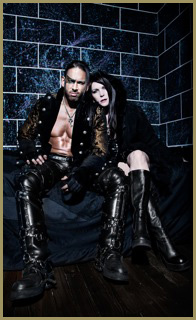

Brainterviews
INTERVIEW WITH
SEBASTIAN ELLIOTT OF BRAINDANCE
CRASH MAGAZINE, ITALY
FALL, 2001

1) after almost four years, braindance has come back...what happened to the band in these years?
as you may already know, braindance is technically an unsigned act, and thus, progressive darkwave recordings functions as a record label and management in name only. we’ve had limited dealings with limited companies with limited integrity and limited dealings with limited companies with limited funds, but nothing substantial. except for a number of individuals who lend their talents because they believe in the project, braindance is self-produced — we’ve been blessed with the learning of this wonderful business as we go.. i feel very fortunate to have had so many people pick up on what we’re doing, and purchased our releases, but doing it by yourself takes a strong toll, especially financially. we wrote and subsequently tracked the album over the course of 1998, and into 1999. unfortunately, several tragedies would follow that prevented redemption from being released as scheduled, including parting ways with long-term drummer notorious, keyboardist/backing vocalist robynne naylor, bassist andy calcina, and more than a handful of flaky investors, production houses, and labels for the cd’s release. And then there’s the rodeo we ran between albums.
2) in what ways do you think that the band’s sound has progressed?
In the quickest way downward.
3) I’d like to know more about shadows and fear itself. in which ways is ‘redemption’ a natural progression from your previous recording efforts? what about the main differences between redemption and your previous releases?
We took all of the most offensive elements from fear itself and shadows and heightened them significantly. Like the other releases, vora produced redemption which features sleeker production, stronger songwriting, denser arrangements, exceptional performances, and niftier packaging, not unlike the new m&m mini’s that the kids love so much.
4) why did you title your new album redemption? Do we have to save ourselves for our sins? What is the concept and what do you want to communicate through this album?
the latin phrase preceding the title track of redemption essentially means, "as above, so below," and can be interpreted as ‘what comes around, goes around,’ or karmic intervention, a central theme within the album, although i believe in a good measure of ambiguity when writing lyrics. naturally, the themes have specific meanings for me, but i try not to assign definitive conceptual values to phrases, because i think listening should be somewhat interactive. insofar as everyone’s experiences are different, so should their interpretations be. whereas i might see despair and desolation, someone else might see nose hair.
5) you like sad and opaque atmospheres — why?
The chicks dig ‘em.
6) the gothic sound is a strong part of your sound — how do you define it?
when we first started braindance, we never really knew what it was that we were doing in the sense of categorization — we simply produced tasty nuggets intended to please ourselves and the temperamental amphibians we surrounded ourselves with. when vora and i first met, i hadn’t even listened to contemporary music for four or five years, and didn’t exactly know what genre i would have liked to have been associated with. it was only after receiving press and response from both the goth/industrial/darkwave community and the progressive community, that we came to be familiar with terms such as gothic, darkwave, ambient, industrial, progressive, death, symphonic, epic, black, doom metal, etc. in fact, i’m still not clear (and have yet to receive a satisfactory explanation) on what those terms and their respective boundaries are. perhaps if i had been clear on those terms and how they are supposed to be communicated musically, we’d be doing something completely different than braindance, something completely identifiable (and non-threatening by industry standards), and probably making more money doing it. We used to call it progressive new age gothic metal fusion, but most people call it doody.
7) why is braindance a duo?
Vora and I have been doing this for almost ten years now, but we’ve had members in braindance come and go. Now we’re working with new bassist david z., new drummer jofu, and new keyboardist constantin v., but travelling as a duo often saves us at checkout when shopping for underwear.
8) what are your future plans?
To amass large quantities of cheese and cleansing products.
9) are there any recording companies interested in your music?
from the start, we felt we owed to ourselves to become recording artists — i don’t believe in granting people the right to decide when my career starts. fortunately, quite a few misguided people out there in candyland felt like spending their hard earned ducats on braindance merchandise. As mentioned, we’ve had limited dealings with limited companies with limited integrity and limited dealings with limited companies with limited funds, but nothing substantial. i would be lying if i told you that i didn’t want large quantities of people to hear our music. But no matter how many fans, dj’s and journalists champion the project, labels have generally ignored us. what we do frightens labels and frightens persons who are responsible for financial return within those labels. independent labels as well as majors have risk to contend with. in order for a label to dump a heap of cash on you, they’ve got to be sure that your music has succeeded in other realms — their competitor must have had one of you, and have done rather well with them. independent labels, for the most part, cater to one form of music, or one specific genre or sub-genre and generally operate no differently — as a business. because what we do crosses a few different sub-genres, there is no ‘niche’ for us, even in the independent (‘underground’) world, which prides itself on promoting new, exciting, underground music.
